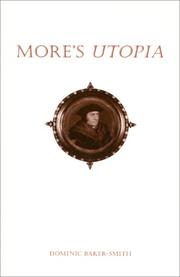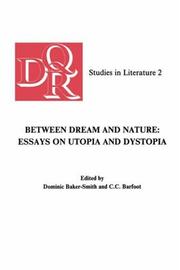| Listing 1 - 10 of 17 | << page >> |
Sort by
|
Book
ISBN: 0048000787 Year: 1991 Publisher: London HarperCollins
Abstract | Keywords | Export | Availability | Bookmark
 Loading...
Loading...Choose an application
- Reference Manager
- EndNote
- RefWorks (Direct export to RefWorks)

ISBN: 9786611995966 1281995967 1442677392 9781442677395 0802083765 9780802083760 Year: 2000 Publisher: Toronto
Abstract | Keywords | Export | Availability | Bookmark
 Loading...
Loading...Choose an application
- Reference Manager
- EndNote
- RefWorks (Direct export to RefWorks)
"Utopia has a strong claim to be the most misunderstood book ever written: its flame has been hijacked by countless idealistic schemes having little in common with More's own assessment of social possibilities. For although it contributes to a line of argument that can be traced from Plato to Marx, Utopia is first and foremost a literary work that appeals to the imagination and seeks to question us rather than to proffer answers." "This study prepares the reader for these challenges, placing the work in the context of early sixteenth-century Europe and the intellectual preoccupations of More's own humanist circle, and clarifying those sources in classical and Christian political thought that provoked his writing." "Utopia is presented as a reflection on political idealism, one that has lost none of its relevance in an age that has witnessed the collapse of Marxist aspirations to social control. Dominic Baker-Smith also surveys the varied critical reception accorded to Utopia over the last four centuries, providing a look at Utopia's role in cultural history."--Jacket
LITERARY CRITICISM / European / General. --- More, Thomas, --- 873.4 MORE, THOMAS --- 873.4 MORE, THOMAS Humanistisch Latijnse literatuur--MORE, THOMAS --- Humanistisch Latijnse literatuur--MORE, THOMAS --- Utopia (More, Thomas, Saint) --- De optimo reipublicae statu, deque nova insula Utopia, libri II (More, Thomas, Saint) --- Thomae Mori Utopia (More, Thomas, Saint) --- Utopia (More, Thomas, Sir, Saint) --- English literature --- History and criticism.

ISBN: 9062039596 Year: 1987 Publisher: Amsterdam Rodopi
Abstract | Keywords | Export | Availability | Bookmark
 Loading...
Loading...Choose an application
- Reference Manager
- EndNote
- RefWorks (Direct export to RefWorks)
Book
Year: 2007 Publisher: Leiden Brill
Abstract | Keywords | Export | Availability | Bookmark
 Loading...
Loading...Choose an application
- Reference Manager
- EndNote
- RefWorks (Direct export to RefWorks)
Book
Year: 2006 Publisher: Angers Moreana
Abstract | Keywords | Export | Availability | Bookmark
 Loading...
Loading...Choose an application
- Reference Manager
- EndNote
- RefWorks (Direct export to RefWorks)
Book
ISBN: 9780141442327 0141442328 Year: 2012 Publisher: London Penguin
Abstract | Keywords | Export | Availability | Bookmark
 Loading...
Loading...Choose an application
- Reference Manager
- EndNote
- RefWorks (Direct export to RefWorks)
Book
ISBN: 9781442698680 1442698683 0802099793 9780802099792 Year: 2010 Publisher: Toronto [Ont.] University of Toronto Press
Abstract | Keywords | Export | Availability | Bookmark
 Loading...
Loading...Choose an application
- Reference Manager
- EndNote
- RefWorks (Direct export to RefWorks)
Consisting of Erasmus' commentary on psalms 38, 83, and 14, this is the third and final volume of the Expositions of the Psalms in the Collected Works of Erasmus. Dating from the last years of Erasmus' life, they represent his mature thoughts on the great crisis facing western Christendom.During the early 1530s, Erasmus explored disputed issues in the Church and attempted to reconcile the warring parties of the Reformation. His characteristic emphasis on the inner experience of faith, rather than outer conformity to a doctrinal checklist, allowed him to be receptive to the insights of reform while refusing to compromise on the essentials of received tradition. By stressing the subjective experience at the heart of religious practice, he sought to reduce the tension of institutional conflict. The exposition of Psalm 38 is here translated into English for the first time, and that of Psalm 14 for the first time since 1537; together with Psalm 83, the three expositions in this collection offer the student of Erasmus an important access to his legacy.
Book
Abstract | Keywords | Export | Availability | Bookmark
 Loading...
Loading...Choose an application
- Reference Manager
- EndNote
- RefWorks (Direct export to RefWorks)
Book
ISBN: 9780374146856 Year: 2019 Publisher: New York Sarah Crichton Books / Farrar Straus and Giroux
Abstract | Keywords | Export | Availability | Bookmark
 Loading...
Loading...Choose an application
- Reference Manager
- EndNote
- RefWorks (Direct export to RefWorks)
Book
ISBN: 9781442674745 Year: 1998 Publisher: Toronto
Abstract | Keywords | Export | Availability | Bookmark
 Loading...
Loading...Choose an application
- Reference Manager
- EndNote
- RefWorks (Direct export to RefWorks)
| Listing 1 - 10 of 17 | << page >> |
Sort by
|

 Search
Search Feedback
Feedback About UniCat
About UniCat  Help
Help News
News